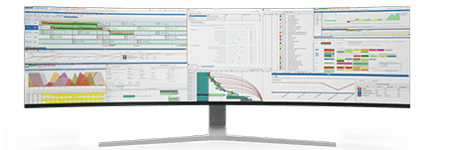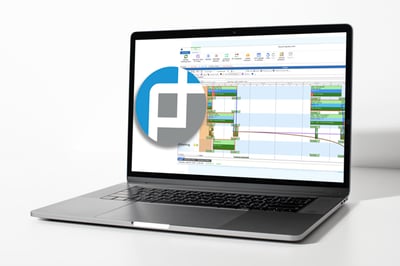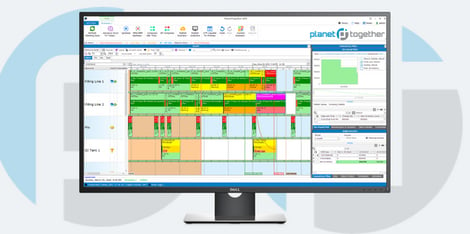
Managing Complex BOM Structures in Production Planning: Leveraging PlanetTogether and ERP Integrations
In packaging manufacturing, production scheduling involves navigating a labyrinth of complex Bill of Materials (BOM) structures. Each product often involves multiple components, subassemblies, and materials, all needing to align in perfect harmony for efficient production. As these structures grow in complexity, so does the challenge of managing them effectively while meeting production targets, ensuring quality, and minimizing costs.
Enter advanced tools like PlanetTogether and its seamless integration with Enterprise Resource Planning (ERP) systems such as SAP, Oracle, Microsoft Dynamics, Kinaxis, or Aveva. Together, they offer production schedulers a transformative way to simplify, optimize, and manage BOM intricacies in packaging manufacturing.

The Challenge of Complex BOM Structures in Packaging Manufacturing
Packaging manufacturers often produce a wide array of products, each with unique specifications. From intricate folding cartons to multi-layered flexible packaging, each product’s BOM can include diverse materials such as paper, foil, adhesives, and inks, alongside associated processes like printing, laminating, and cutting.
Key challenges include:
Multilevel BOMs: Products often require multiple levels of subassemblies. Managing dependencies and ensuring the right materials are available at every stage is complex.
Frequent Design Changes: Customer demands for customization often lead to BOM changes, which need to be reflected promptly in production schedules.
Material Constraints: Limited material availability or long lead times can disrupt production if not managed proactively.
Coordination Across Teams: Collaboration between procurement, production, and quality teams is essential but challenging, especially when dealing with evolving BOM data.
Production Variability: Variances in production, such as machine downtime or quality issues, can have cascading effects on BOM requirements.

Why PlanetTogether?
PlanetTogether is a powerful Advanced Planning and Scheduling (APS) software designed to tackle such complexities. By integrating with leading ERP systems, it creates a dynamic environment for managing BOM structures with precision and efficiency.
Key Features for BOM Management
Real-Time Visibility: PlanetTogether provides real-time insights into BOM structures and their dependencies, enabling schedulers to make informed decisions.
Dynamic Scheduling: The software adjusts production schedules dynamically, considering material availability, machine capacity, and other constraints.
Integration with ERP Systems: When paired with SAP, Oracle, Microsoft Dynamics, Kinaxis, or Aveva, PlanetTogether synchronizes BOM data, ensuring consistency across all departments.
Scenario Planning: Schedulers can simulate various scenarios, such as material shortages or production delays, to identify the best course of action.
Alerts and Notifications: Automated alerts help identify potential bottlenecks or disruptions, ensuring proactive management.

The Power of ERP Integration
The integration between PlanetTogether and ERP systems brings unparalleled advantages:
Streamlined Data Flow
ERP systems act as a central repository for BOM data, storing details about materials, quantities, and supplier information. When integrated with PlanetTogether, this data flows seamlessly into the APS system, eliminating manual data entry and ensuring accuracy.
For example, SAP’s Material Requirements Planning (MRP) data can feed directly into PlanetTogether, allowing schedulers to visualize material constraints and align production schedules accordingly.
Improved Collaboration
ERP systems facilitate cross-departmental collaboration by providing a unified platform for sharing BOM data. Integration with PlanetTogether ensures that production schedules reflect the latest updates, keeping procurement, production, and quality teams on the same page.
Enhanced Forecasting
Combining ERP’s demand forecasting capabilities with PlanetTogether’s scheduling tools enables better anticipation of material needs. Kinaxis’s RapidResponse, for instance, can predict demand fluctuations, helping schedulers plan accordingly.
Agility in Change Management
When BOM changes occur, the integration ensures these updates are reflected immediately in production schedules. For example, if a customer modifies packaging specifications, Oracle ERP can update the BOM, and PlanetTogether can adjust the schedule dynamically.

Best Practices for Managing Complex BOMs with PlanetTogether and ERP Systems
Maintain Accurate BOM Data: Ensure the ERP system is up-to-date with accurate and detailed BOM information. This forms the foundation for effective scheduling.
Leverage Real-Time Insights: Use PlanetTogether’s real-time visibility to identify bottlenecks and optimize schedules proactively.
Implement Scenario Planning: Anticipate potential disruptions and prepare contingency plans using PlanetTogether’s simulation capabilities.
Foster Cross-Functional Collaboration: Encourage collaboration between teams by using the integration to share data and insights.
Invest in Training: Equip your team with the skills to utilize both the ERP and APS systems effectively.
For production schedulers in packaging manufacturing, managing complex BOM structures is a daunting but critical task. By integrating PlanetTogether with robust ERP systems like SAP, Oracle, Microsoft Dynamics, Kinaxis, or Aveva, schedulers can gain the visibility, agility, and precision needed to navigate these complexities effectively.
In an industry where efficiency, quality, and timeliness are paramount, leveraging these advanced tools is not just an option—it’s a necessity. With the right strategies and technology in place, production schedulers can turn BOM challenges into opportunities for growth and success.
Are you ready to take your manufacturing operations to the next level? Contact us today to learn more about how PlanetTogether can help you achieve your goals and drive success in your industry.